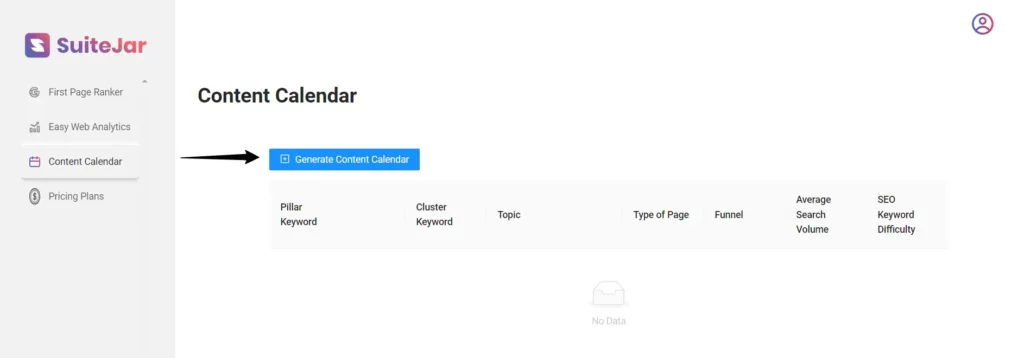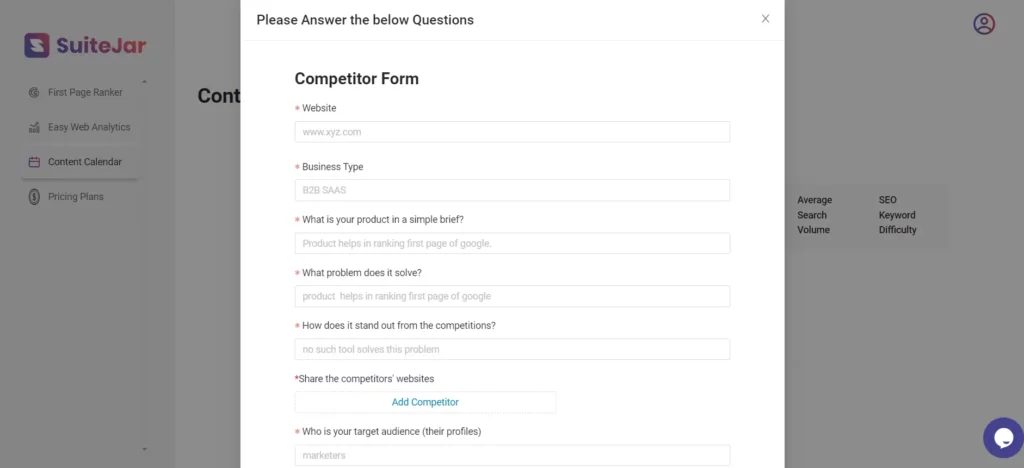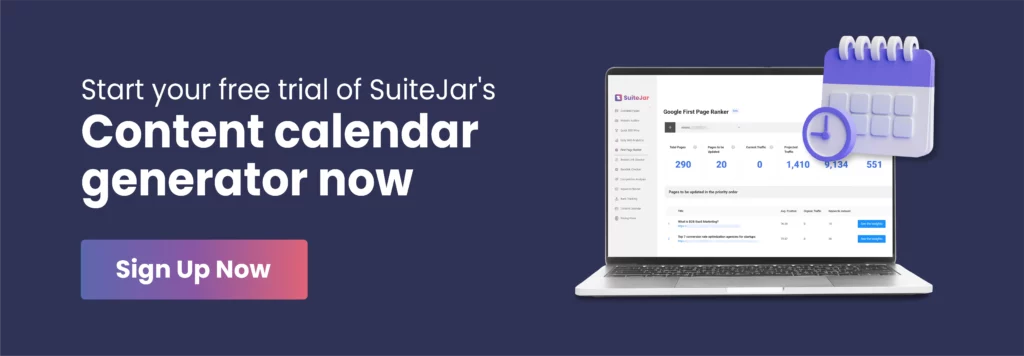Only $99 for a full year!
No credit card required
Rank on Google's first page in 3 months
Struggling with Content Planning? A Content Calendar Generator Can Help
Jul 12, 2024 | prashant@growth.cxAnyone engaged in content marketing should prioritize maintaining a detailed content calendar. Such a calendar ensures that all your content activities are coordinated, simplifying the planning process and helping your content reach a wider audience effectively.
But even with a well-planned strategy, content calendars face challenges. Traditional templates can be inflexible, and manually entering data is typically time-consuming. These issues highlight the value of using AI content calendar generators, which are designed to streamline these processes and mitigate common obstacles.
This blog shows you how AI content calendar generators enhance the creation of content for your website and help optimize your content marketing efforts.
What Is A Content Calendar?
A content calendar is an essential tool for anyone involved in digital marketing and content creation. It’s essentially a schedule outlining when and where your content will be published. This includes details like the topics you plan to cover, the publication dates, and the platforms where the content will be shared, such as blogs, social media channels, or email newsletters.
A content calendar is more than just a scheduling tool; it’s a strategic asset that can enhance the effectiveness of your content marketing efforts, ensuring every piece of content is crafted with purpose and precision.
A content calendar typically includes sections like:
- Topics
- Dates
- Platforms
- Status
- Ownership
- BOFU/MOFU/TOFU funnel (for blog content calendars)
Benefits of Using an AI Content Calendar Generator
- Enhanced Organization: With a content calendar, you can plan your content production efficiently, manage resources effectively, and avoid last-minute rushes. It provides a clear roadmap of what needs to be done and ensures all team members are on the same page.
- Consistent Posting: Consistency in content delivery is key to building and maintaining an audience. A content calendar helps you schedule regular updates and maintain a consistent presence on your blog and social media platforms, which is crucial for audience engagement and growth.
- Strategic Content Alignment: A content calendar allows you to strategically align your content with key business goals and marketing campaigns. It ensures your content supports product launches, promotions, and other business activities, maximizing the impact of your marketing efforts.
- Better Quality Control: By planning content in advance, you have more time to research, create, and refine your content before it goes live. This leads to higher quality, more thoughtful content that better serves the needs of your audience.
- Efficient Resource Management: A content calendar provides a snapshot of upcoming content needs, helping you manage and allocate resources more effectively. It also helps in tracking performance and understanding the types of content that resonate with your audience, allowing for more informed decision-making in future planning.
How to Create a Content Calendar Step-by-Step
1. Create your content calendar template
First, you need to create a template for all your website content. This helps with organization and timely publishing. Here are some basic and essential details to include:
- Topic name
- Publish date
- Author name
- Status
- Content type
- Link to files
While these are essential details, there will be additional fields needed depending on the specific content type.
Here are some additional details for specific content types:
- Blog posts:
- Topic/title
- Blog URL
- Link to files
- Content type
- Seed keyword
- Primary keyword + search volume + difficulty
- LSI keywords
- Publish date
- Funnel type
- Status
- Author
- Social media posts:
- Image or video file
- Caption
- Tagged users
- Hashtags
- Videos:
- Link to script
- Caption
- Video files
- Thumbnail
Once you’ve created the calendar, share it with your team so they can use it as their project calendar as well.
2. Choose Topics for Your Content Calendar
The next step is to choose topics that will drive traffic to your website. Research your target audience to understand their needs and interests. This will help you generate relevant content topics for them.
Once you have a good amount of topics, add them to your calendar and fill in all the relevant details. You can categorize the calendar by month to help manage tasks and deadlines.
Yes, choosing topics for your content calendar can be a time-consuming process. It involves research on trending topics, competitor analysis, keyword searching, and more. This can be tedious, but it’s an important step.
Here’s where AI content calendar generators can be a valuable solution. We’ll discuss how to create a blog content calendar using one of these tools, pre-populated with topics relevant to your target audience.
3. Creating a Blog Content Calendar with an AI Content Calendar Generator
Using a single AI content calendar generator can help you set up a calendar with minimal effort. Imagine not having to spend hours creating topics from scratch! Simply by entering some key details, you can get a list of potential content topics for your blog.
Suitejar‘s content marketing tool offers an AI-powered content calendar generator feature that allows you to create a calendar with a single entry of your website details.

Go to the Suitejar content calendar and click on the “Generate Content Calendar” option. This will open a new interface where you can provide details about your website.

After submitting your website details, the tool will suggest potential keywords based on your website content and competitor URLs. You can also have the option to add the preferred keywords that you selected for your content.
Once you submit everything, you’ll see a list of content topic suggestions based on your provided information. This list will include the topic title, primary keyword, cluster keyword, content type, funnel stage, search volume, and SEO difficulty.
With just one entry of your business details, you can get a complete content calendar for your blog. This eliminates the need to spend hours searching for topics online.
Conclusion
To conclude, content calendar generators that use artificial intelligence have greatly changed how people approach content planning and creating content calendars. When equipped with this content calendar, you can publish regularly, reach out to the right audience, and obtain the desired results in content marketing.
But remember, a content calendar is not the only thing; you need to set up a proper SEO-focused content strategy, too.

FAQ
1. What are the benefits of a content calendar?
A content calendar improves and streamlines workflows and enhances entire team collaboration. It helps to maintain a consistent content publishing schedule and allows for better tracking and measurement of content performance.
2. How to make your own content calendar?
To create your own content calendar, you must choose a format like a spreadsheet or calendar app and list important dates and events. You must also plan your content themes and topics, assigning dates and responsible team members. You must regularly review and adjust the content calendar.
3. What are the security concerns of using a content calendar generator?
These concerns include assuring data privacy and protecting sensitive information. You have to manage access control to manage who can view and edit the calendar. There are risks of data breaches, and compliance with regulatory requirements is also necessary to avoid legal issues.
